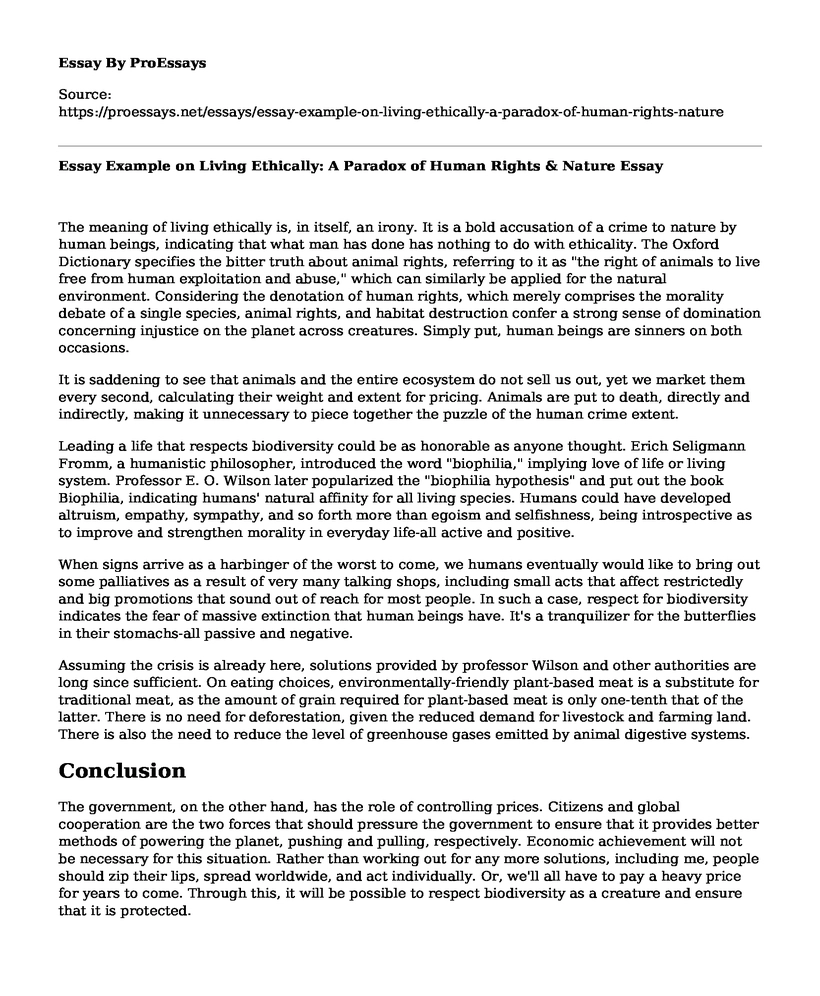The meaning of living ethically is, in itself, an irony. It is a bold accusation of a crime to nature by human beings, indicating that what man has done has nothing to do with ethicality. The Oxford Dictionary specifies the bitter truth about animal rights, referring to it as "the right of animals to live free from human exploitation and abuse," which can similarly be applied for the natural environment. Considering the denotation of human rights, which merely comprises the morality debate of a single species, animal rights, and habitat destruction confer a strong sense of domination concerning injustice on the planet across creatures. Simply put, human beings are sinners on both occasions.
It is saddening to see that animals and the entire ecosystem do not sell us out, yet we market them every second, calculating their weight and extent for pricing. Animals are put to death, directly and indirectly, making it unnecessary to piece together the puzzle of the human crime extent.
Leading a life that respects biodiversity could be as honorable as anyone thought. Erich Seligmann Fromm, a humanistic philosopher, introduced the word "biophilia," implying love of life or living system. Professor E. O. Wilson later popularized the "biophilia hypothesis" and put out the book Biophilia, indicating humans' natural affinity for all living species. Humans could have developed altruism, empathy, sympathy, and so forth more than egoism and selfishness, being introspective as to improve and strengthen morality in everyday life-all active and positive.
When signs arrive as a harbinger of the worst to come, we humans eventually would like to bring out some palliatives as a result of very many talking shops, including small acts that affect restrictedly and big promotions that sound out of reach for most people. In such a case, respect for biodiversity indicates the fear of massive extinction that human beings have. It's a tranquilizer for the butterflies in their stomachs-all passive and negative.
Assuming the crisis is already here, solutions provided by professor Wilson and other authorities are long since sufficient. On eating choices, environmentally-friendly plant-based meat is a substitute for traditional meat, as the amount of grain required for plant-based meat is only one-tenth that of the latter. There is no need for deforestation, given the reduced demand for livestock and farming land. There is also the need to reduce the level of greenhouse gases emitted by animal digestive systems.
Conclusion
The government, on the other hand, has the role of controlling prices. Citizens and global cooperation are the two forces that should pressure the government to ensure that it provides better methods of powering the planet, pushing and pulling, respectively. Economic achievement will not be necessary for this situation. Rather than working out for any more solutions, including me, people should zip their lips, spread worldwide, and act individually. Or, we'll all have to pay a heavy price for years to come. Through this, it will be possible to respect biodiversity as a creature and ensure that it is protected.
Cite this page
Essay Example on Living Ethically: A Paradox of Human Rights & Nature. (2023, May 08). Retrieved from https://proessays.net/essays/essay-example-on-living-ethically-a-paradox-of-human-rights-nature
If you are the original author of this essay and no longer wish to have it published on the ProEssays website, please click below to request its removal:
- Paper Sample - Legalization of Marijuana in the US
- The Stories on the Jerry Sandusky Arrest Essay
- Artificial Intelligence and Theory of Mind Essay Example
- Utilitarian Act Versus Principle Essay Example
- Essay Example on Peer Courts: A Tool for Youth Transformation
- Essay Sample on Crime & Punishment: Mens Rea & Acts Rea in the Criminal Code
- Paper Sample on Review of Murder State: Chapter 5 - Democratic Death Squads of Northern California







